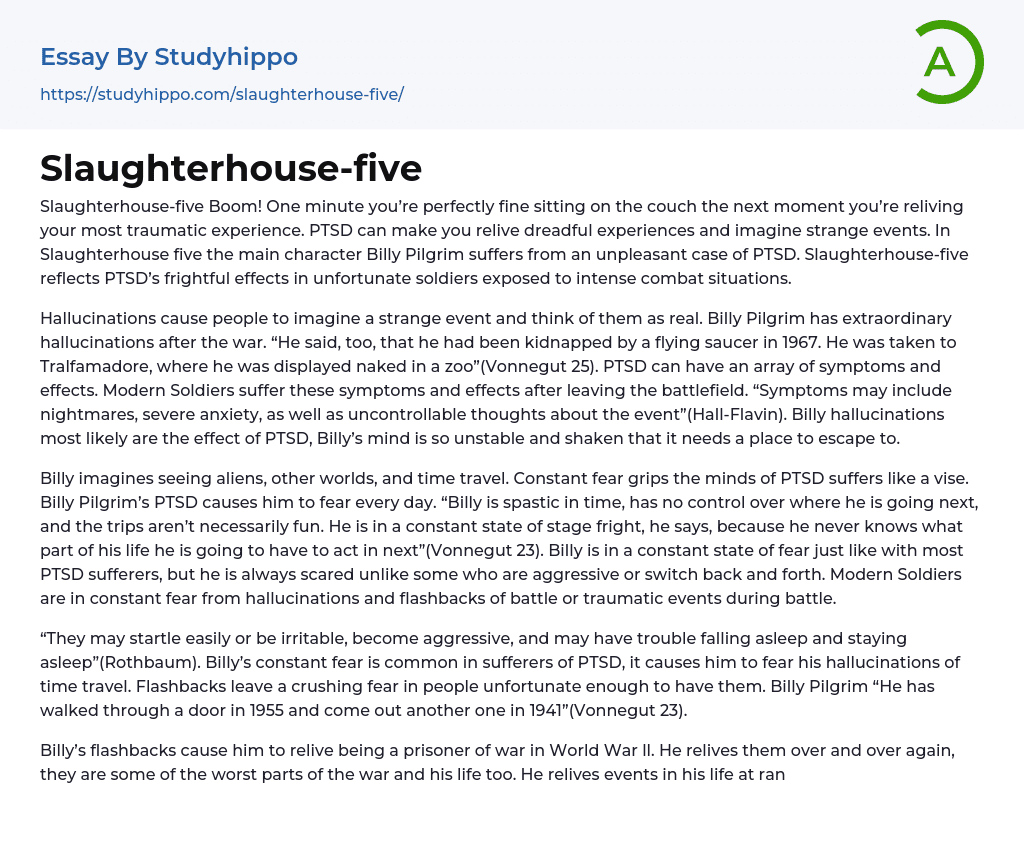Slaughterhouse-five Boom! One minute you’re perfectly fine sitting on the couch the next moment you’re reliving your most traumatic experience. PTSD can make you relive dreadful experiences and imagine strange events. In Slaughterhouse five the main character Billy Pilgrim suffers from an unpleasant case of PTSD. Slaughterhouse-five reflects PTSD’s frightful effects in unfortunate soldiers exposed to intense combat situations.
Hallucinations cause people to imagine a strange event and think of them as real. Billy Pilgrim has extraordinary hallucinations after the war. “He said, too, that he had been kidnapped by a flying saucer in 1967. He was taken to Tralfamadore, where he was displayed naked in a zoo”(Vonnegut 25). PTSD can have an array of symptoms and effects. Modern Soldiers suffer these symptoms and effects after leaving the battlefi
...eld. “Symptoms may include nightmares, severe anxiety, as well as uncontrollable thoughts about the event”(Hall-Flavin). Billy hallucinations most likely are the effect of PTSD, Billy’s mind is so unstable and shaken that it needs a place to escape to.
Billy imagines seeing aliens, other worlds, and time travel. Constant fear grips the minds of PTSD suffers like a vise. Billy Pilgrim’s PTSD causes him to fear every day. “Billy is spastic in time, has no control over where he is going next, and the trips aren’t necessarily fun. He is in a constant state of stage fright, he says, because he never knows what part of his life he is going to have to act in next”(Vonnegut 23). Billy is in a constant state of fear just like with most PTSD sufferers, but he is always scared unlike some who are aggressive or switch back and forth. Modern Soldier
are in constant fear from hallucinations and flashbacks of battle or traumatic events during battle.
“They may startle easily or be irritable, become aggressive, and may have trouble falling asleep and staying asleep”(Rothbaum). Billy’s constant fear is common in sufferers of PTSD, it causes him to fear his hallucinations of time travel. Flashbacks leave a crushing fear in people unfortunate enough to have them. Billy Pilgrim “He has walked through a door in 1955 and come out another one in 1941”(Vonnegut 23).
Billy’s flashbacks cause him to relive being a prisoner of war in World War ll. He relives them over and over again, they are some of the worst parts of the war and his life too. He relives events in his life at random, such as his father throwing him into a swimming pool to learn to swim. He dreads the memory of his father throwing him into the pool and nearly drowning. Modern Soldiers flashbacks are of their worst memories, most commonly the event that caused their PTSD.“ Flashbacks are dissociative because when a person has a flashback, they generally believe that they are actually 'back there' in both time and place”(Marich).
Billy had flashbacks of the war and believed that he was actually there. He believed he was time traveling, unbeknownst to him he was having flashbacks of the war, his childhood, and other random events of his life. In slaughterhouse five Billy Pilgrim becoming unstuck in time is him really just have hallucinations and flashbacks from PTSD. Throughout the book, Billy “travels in time” and sees different events of his life. From his birth to World War 2, to his death, Billy suffers
from the disorder and imagines his past and future. Billy shows clear symptoms of the disorder throughout the book. Slaughterhouse-five reflects PTSD’s frightful effects in unfortunate soldiers exposed to intense combat situations.
Works Cited
- Hall-Flavin, Daniel. “Meet Our Medical Editors - About This Site.” Mayo Clinic, Mayo Foundation for Medical Education and Research, 8 Jan. 2019, www.mayoclinic.org/about-this-site/meet-our-medical-editors.
- Marich, Jamie. “Flashbacks, Dissociative Reactions.” Child & Adolescent Development: Overview, 1995, www.gulfbend.org/poc/view_doc.php?type=doc&id=55734&cn=109.
- Rothbaum, Barbara. “Feature: Post Traumatic Stress Disorder PTSD: A Growing Epidemic / Neuroscience and PTSD Treatments | NIH MedlinePlus the Magazine.”
- MedlinePlus, U.S. National Library of Medicine, medlineplus.gov/magazine/issues/winter09/articles/winter09pg10-14.html. Vonnegut, Kurt. Slaughterhouse-Five. New York: Vintage, 2016.




